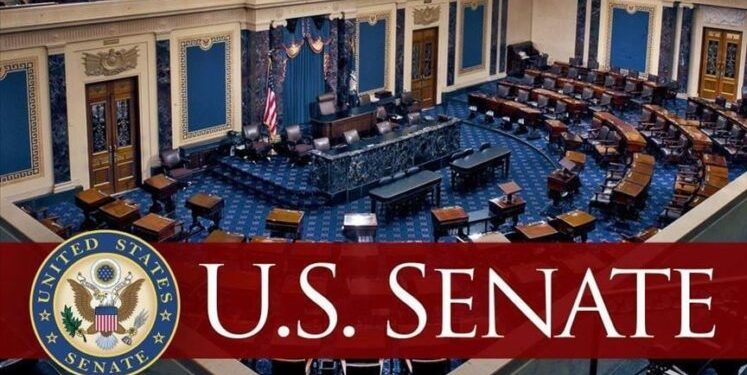A new bill moving through the United States Congress has placed Nigeria under fresh international scrutiny, proposing sweeping sanctions on political officeholders, judges, and security officials accused of enabling or ignoring religious persecution.
The proposed legislation, sponsored by Republican Senator Ted Cruz, is titled the “Nigeria Religious Freedom Accountability Act of 2025.”
It recently scaled its second reading in the U.S. Senate and has now been referred to the Senate Committee on Foreign Relations for further consideration.
If passed, analysts say it could become one of the toughest U.S. policy actions toward Nigeria in decades.
The new measure follows House Resolution 594, already endorsed by 18 members of the U.S. House Committee on Foreign Affairs.
It draws heavily from reports by international watchdogs, including the Open Doors World Watch List 2025, which states that Nigeria accounted for 82 percent of the 4,998 Christians killed globally in 2023.
Additional references in the bill cite findings from Vatican News and Genocide Watch, which estimate that between 2009 and 2023, at least 52,000 Christians and 34,000 moderate Muslims were killed in Nigeria, with over five million people displaced by religiously motivated violence.
Senator Cruz described religious persecution in Nigeria as “endemic,” blaming it partly on extremist ideologies and the institutionalisation of Sharia-based legal systems in several northern states.
“Religious violence against Christians and other minorities is systemic and deeply rooted.
“Congress must act decisively to hold perpetrators and enablers accountable,” Cruz said.
He urged lawmakers to move the bill “expeditiously,” warning that continued inaction would embolden those behind religious killings.
A key provision of the bill directs the U.S. Secretary of State to designate Nigeria as a “Country of Particular Concern (CPC)” under the International Religious Freedom Act, a label reserved for nations that engage in or tolerate severe violations of religious liberty.
Once designated, the CPC status would automatically trigger mandatory sanctions, including: Suspension of U.S. military cooperation and arms sales, Restrictions on economic assistance and security training and Annual public reporting on officials, judges, and security agents linked to religious persecution.
The first list of sanctioned individuals is expected within 90 days of passage, with updates to follow annually.
The draft legislation explicitly mentions 12 northern Nigerian states; Bauchi, Borno, Gombe, Jigawa, Kaduna, Kano, Katsina, Kebbi, Niger, Sokoto, Yobe, and Zamfara, for enforcing blasphemy laws that it says violate international human rights standards.
The bill demands that Nigeria Amend or repeal laws criminalising blasphemy, Prosecute those involved in religious killings and Dismantle extremist networks or risk indefinite sanctions.
The proposed penalties are described as unprecedented in scope.
If enacted, the law would empower Washington to impose visa bans, asset freezes, and criminal restrictions on:
- Governors of states where religious killings occur
- Judges handling blasphemy-related prosecutions
- Police, prison, and security officers enforcing religious laws
It specifically targets anyone who “prosecutes, convicts, imprisons, or deprives individuals of liberty on blasphemy charges.”
The bill follows testimony from Nigerian religious leaders and human rights advocates at a U.S House Subcommittee on Africa hearing, where witnesses described widespread attacks in Plateau, Benue, and Southern Kaduna as “nightly sieges” on local communities.
While the U.S. characterises such incidents as terrorism, Nigerian authorities have often referred to the perpetrators as “bandits.”
Meanwhile, China, one of Nigeria’s major strategic partners, has criticised the proposed law. Chinese Foreign Ministry spokesperson Mao Ning said, “as Nigeria’s strategic partner, China firmly opposes any country using religion or human rights as a pretext to interfere in another nation’s internal affairs.”
Analysts view the exchange as part of a broader geopolitical competition between Washington and Beijing for influence in Africa.
If enacted, the legislation could:
- Restrict U.S. military and security cooperation with Nigeria
- Limit access to defence and development programmes
- Trigger visa bans on senior officials
- Strain diplomatic relations between Abuja and Washington.
Nigeria would only be removed from the CPC list after verifiable progress in:
- Reducing religious killings
- Reforming blasphemy laws
- Prosecuting offenders transparently
For the bill to become law, it must:
- Pass through the Senate Foreign Relations Committee
- Gain full Senate approval
- Be harmonised with a similar House bill
- Receive the President’s signature
With Republicans currently holding 52 Senate seats and a majority in the House, observers believe the bill has a strong chance of passage, potentially reshaping U.S.-Nigeria relations for years to come. (Courtesy: www.dailygazettenig.com)









